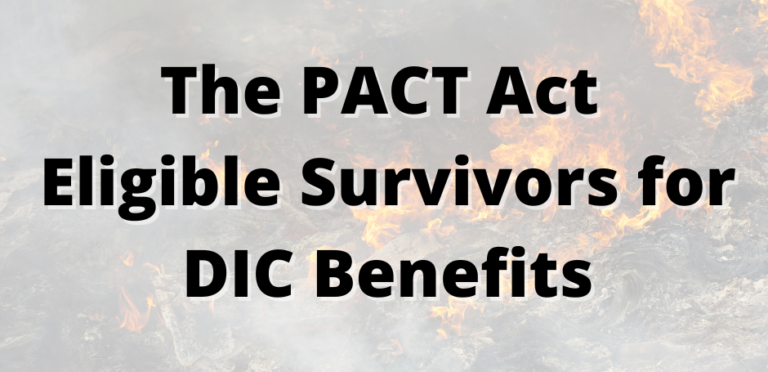
Eligible survivors who previously filed for DIC benefits
The PACT Act became law on August 10, 2022, by President Biden. The PACT Act is a comprehensive set of regulations that entitle more Veterans to presumptive disability benefits and healthcare.
The PACT Act includes many new conditions that are now presumptive. These presumptions are due to a Veteran’s active military, naval, air, or space service. With these new updates, dependents of a deceased Veteran may now be eligible to receive dependency and indemnity compensation (DIC) benefits from VA.
Dependency and indemnity compensation (DIC) is a monthly benefit paid to eligible surviving dependents of a deceased Veteran who died from a service-related injury or illness.
The updates in the PACT Act mean that claims where DIC was previously denied may now be eligible for reevaluation.
If you are the eligible dependent of a Veteran that passed away that had previously applied for DIC and was denied, you can reapply under the new conditions that the PACT Act honors.
Who is an eligible Survivors for DIC Benefits
- Spouse of a deceased Veteran
- Dependent child of a deceased Veteran
- Dependent parent of a deceased Veteran
Learn more about surviving dependent children and parents here
Eligibility for a spouse of a deceased Veteran:
One of these must be true:
- You lived with the Veteran or service member without a break until their death, or
- If you’re separated, you weren’t at fault for the separation
And one of these must be true:
- You married the Veteran or service member within 15 years of their discharge from the period of military service during which the qualifying illness or injury started or got worse, or
- You were married to the Veteran or service member for at least 1 year, or
- You had a child with the Veteran or service member
Note: If you remarried, you can receive or continue to receive compensation if one of these describes you:
- You remarried on or after December 16, 2003, and you were 57 years of age or older at the time you remarried, or
- You remarried on or after January 5, 2021, and you were 55 years of age or older at the time you remarried
Learn more about the evidence you’ll need to support your claim
If you are a spouse of a deceased Veteran and they were receiving disability compensation due to one of the presumptive medical conditions on the list, you may be eligible for VA disability compensation.
- You can find out more about filing a claim for VA disability benefits by clicking here. Make sure to fill out the form completely and respond to any requests from VA. For additional information about your medical conditions or treatment.
If you were previously denied dependency and indemnity compensation for one of the locations. Or conditions that the PACT Act has updated, you can now refile by submitting VA Form 21-526EZ to VA.
Are you interested in filing an initial claim? Find out more.
Do you want to check the status of your initial claim or appeal? Sign in to your VA.gov account.
Are you currently homeless or about to be homeless? This page may help.
Learn more about Bergmann & Moore and our services for Veterans and their family members.

One of the largest law firms in the country practicing solely in the area of Veterans’ benefits. Managed by former VA attorneys. We know the journey and can get you through.
Disclaimer: The information contained on this website is not legal advice. Using the information provided on this website or contacting Bergmann & Moore, LLC does not establish an attorney-client relationship. [Privacy Policy]


